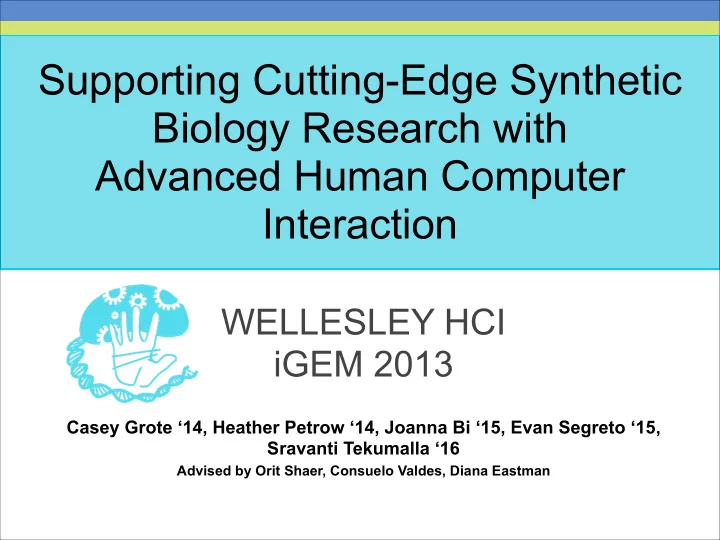

Supporting Cutting-Edge Synthetic Biology Research with Advanced Human Computer Interaction WELLESLEY HCI iGEM 2013 Casey Grote ‘14, Heather Petrow ‘14, Joanna Bi ‘15, Evan Segreto ‘15, Sravanti Tekumalla ‘16 Advised by Orit Shaer, Consuelo Valdes, Diana Eastman
Our Vision To apply engineering and human- computer interaction methodologies to promote collaboration and problem solving in the synthetic biology experimental process .
HCI and Synthetic Biology ● Create rich visual tools to make complex synthetic biology concepts and ideas more accessible � ● Reduce error in the bio-design process � ● Improve workflow by integrating resources across multiple platforms � ● Move towards automation
This Time Last Year “Can you support top-down design?”
User-Centered Design Design Develop Evaluate
Our Goals Goal 1: Simplify the research and information-gathering process � Goal 2: Streamline the design and specification of complex constructs � Goal 3: Convey basic synthetic biology concepts to non-scientists
Our Projects E ugenie Multi-touch application that uses a visual language to aid in the design of novel genetic devices zTree Interactive 3D Visualization of the iGEM Registry Bac to the Future Interactive installation teaching synbio concepts to broad audiences
Eugenie A collaborative design tool for genetic devices
Goals � • Support top-down design • Enhance sensemaking • Integrate resources • Support flexible work styles
Top-Down Design Bottom-Up Design : L0: Basic Modules L1: Transcriptional Units L2: Multigene Constructs Top-Down Design : Specify Generate Add rules to generic permutations prune results parts
Visual Language | Eugene � /*** Repressors ***/ gcaatattatgatgacgctaatttaataaaatatgatccta /*** Signaling Molecules ***/ /*** Repressible Promoters ***/ /*** INVERTER DEVICES ***/ /** PROPERTIES ***/ Repressor cI( tagtagattattctaactccaatcattcaccaattaattgg � tctcgttgaccctgagcaggctgttgagccaggtgatttct Molecule mol1("mol1"); RepressiblePromoter pLux( Property Name(txt); .Name("BBa_C0051"), aatatatttgaaaacaat gcatagccagacttgggggtgatgagtttaccttcaagaa Molecule mol2("mol2"); .Name("pLux"), Device Inverter01(InduciblePromoter, RBS, Repressor, Terminator); Property Sequence(txt); .Represses("pCI"), gctgtaaataaaaaatctccaaatgtaattaaagaagcg actgatcagggatagcggt Molecule mol3("mol3"); .Sequence("acctgtaggatcgtacaggtttacg Property Represses(txt); Device Inverter02(RepressiblePromoter, RBS, Reporter, � .Sequence("atgagcacaaaaaagaaaccattaa aaaacatcaggtcttatcactgggtttagtttccctattcat caggtgtttttacaaccactaaacccacagtacccaatga caagaaaatggtttgttatagtcgaatacctctggcgg Property InducedBy(txt); Terminator); acggctaacaatggcttcg cacaagagcagcttgaggacgcacgtcgccttaaagca tcccatgcaatgagagttgttccgttgtggggaaagttatc � tgata")); /*** Inducible Promoters ***/ Device Inverter = Inverter01 + Inverter02; atttatgaaaaaaagaaaaatgaacttggcttatccc gaatgcttagttttgcacattcagaaaaagacaactatat gctagtcagtggcctgaag InduciblePromoter pBad( /** PART TYPES ***/ println(Inverter); aggaatctgtcgcagacaagatggggatggggcagtca agatagtttatttttacatgcgtgtatgaacataccattaat agacgtttggcgctgcaaacgacgaaaactacgctttagt RepressiblePromoter pTetR( .Name("pBad"), � PartType InduciblePromoter(Name, tgttccttctctagttga ggcgttggtgctttatttaatggcatcaatgcattaaatgct agcttaataa")); .Name("pTetR"), � .Sequence("acattgattatttgcacggcgtcacact � Sequence, InducedBy); tataacgccgcattgcttgc taattatcgaaaaataaatatagcaaataataaatcaaa .Sequence("tccctatcagtgatagagattgaca ttgctatgccatagcaagatagtccataagattagcggat PartType RepressiblePromoter(Name, aaaaattctcaaagttagcgttgaagaatttagcccttca /*** PRODUCE ALL VALID INVERTER DEVICES ***/ caacgatttaaccaaaagagaaaaagaatgtttagcgtg Repressor LuxR( tccctatcagtgatagagatactgagcac")); cctacctgacgctttttatcgcaactctctactgtttctccat Sequence); ggcatgcgaaggaaaaagctct � atcgccagagaaatctacgagatgtatgaagcggttagt product(Inverter); .Name("LuxR"), accgtttttttgggctagc"), PartType RBS (Name, Sequence); atgcagccgtcacttagaagt tgggatatttcaaaaatattaggttgcagtgagcgtactgt .Represses("pLux"), .InducedBy("mol1")); RepressiblePromoter pCI( PartType Repressor(Name, Sequence, gagtatgagtaccctgttttttctcatgttcaggcagggat � cactttccatttaaccaatgcgcaaatgaaactcaataca .Sequence("atgaaaaacataaatgccgacgacaca .Name("pCI"), Represses); acaaaccgctgccaaagta gttctcacctgagcttagaacctttaccaaaggtgatgcg tacagaataattaataaaattaaagcttgtagaagcaata InduciblePromoter pDntR( .Sequence("taacaccgtgcgtgttgactatttta PartType Terminator(Name, Sequence); gagagatgggtaagcacaa tttctaaagcaattttaacaggagcaattgattgcccatac atgatattaatcaatgcttatctgatatgacta .Name("pDntR"), cctctggcggtgataatggttgc")); PartType Reporter(Name, Sequence); tttaaaaattaataa")); ccaaaaaagccagtgattctgcattctggcttgaggttga aaatggtacattgtgaatattatttactcgcgatcatttatc .Sequence("ATAC"), � PartType Molecule(Name); aggtaattccatgaccgcaccaacaggctccaagccaag ctcattctatggttaaatctgatatttcaatcctagataatt .InducedBy("mol2")); Repressor araC( ctttcctgacggaatgttaat accctaaaaaatggag .Sequence(" ttatgacaacttgacggctacatcattcactttttcttcaca accggcacggaactcgctcgggctggccccggtgcatttt ttaaatacccgcgagaaa tagagttgatcgtcaaaaccaacattgcgaccgacggtg gcgataggcatccgggtggtgctcaaaagcagcttcgcc tggctgatacgttggtcctcgc Inverter Device gccagcttaagacgctaatccctaactgctggcggaaaa gatgtgacagacgcgacggcgacaagcaaacatgctgt
Visual Language | Research Microsoft Visual Scratch (MIT) Programming Language
Visual Language | Our Language
Demo video
Implementation • Microsoft PixelSense: o Surface SDK 2.0 o Support for direct touch manipulation o Support for mouse manipulation • Languages: o User Interface: XAML o Backend: C# • Eugene: o Constraint-based permutation • Integrating Resources: o Parts Registry o Clotho Database o Local Database o Pigeon
Evaluation ● Participants: 15 users from Boston University and MIT iGEM teams, as well as students from Wellesley College ● Task: ○ Read and draw SBOL diagrams ○ Translate SBOL diagrams into our visual language ○ Use Eugenie to specify one of the genetic devices they had translated
Results
Results
Results I want to be able I want to see all of to scale the part the relationships according to how between parts in many base pairs one panel it has I want a visual indication of which promoters are active under a specific condition
zTree An interactive 3D tool to visualize large data sets
Goals ● Enable visualization of a complex, hierarchical structure in its entirety � ● View individual parts in context of the whole data space � ● Create a unique user experience Robertson, G.G., Mackinlay, J.D., & Card, S.K. (1991). Cone Trees: Animated 3D Visualizations of Hierarchical Information.
zSpace: Holographic Computing
2D vs 3D Display
Demo video
Implementation ● Unity for 3D Graphics � ● C# for backend � ● Registry API for part information
Evaluation ● Participants: 9 users from Wellesley College ● Task: Compare user experience and understanding using zTree versus Registry website. ○ Browse for a specific part ○ Estimate the number of parts in a category ○ Compare two different part types
Results
Results Feedback to Inform Future Improvement � ● Improve Search � ● Improve Visuals/Layout � ● Include Detailed Part Information
Bac to the Future An interactive installation introducing synthetic biology concepts
Goals ● Facilitate learning of Synthetic Biology concepts ● Engage users through interactivity and visual feedback ● Target application to non-scientists ● Reach broad audiences through the use of social media
What is Bac to the Future? 1. Encode message into DNA codons 2. Insert part into plasmid 3. Insert plasmid into E.coli 4. View backwards translation of the bacteria’s message database
Implementation ● HTML5 ● Javascript ● JQuery ● Python ● Google App Engine ● Twitter
Evaluation ● Participants: 15 high school students from the MIT-Wellesley Upward Bound Program ● Task: ○ Evaluate user knowledge of synthetic biology before and after the study ○ Note user engagement and enjoyment during interactive with our project
Results
Results
Summary Simplify the research process and make Eugene more accessible 3-D visualization of multi-tiered data structures � Convey basic synthetic biology concepts to non-scientists
Future Work Eugenie • Support rule creation between devices • Implement option for including device backbone • Create a web application version of Eugenie zTree • Animate carousels on and off screen • Improve search function for specific parts • Allow use of data sets from other databases Bac to the Future • Create interactive installation using gesture technology • Explore potential education applications
Recommend
More recommend